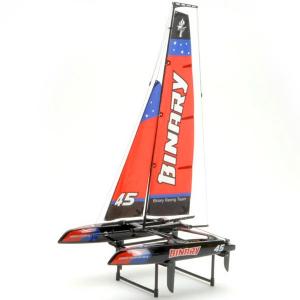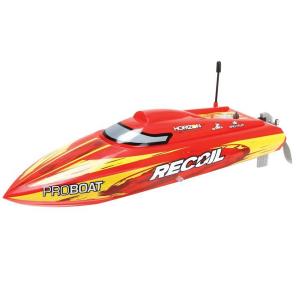RC Boats
The allure of open waters has captivated human imagination for centuries. The gentle lapping of waves, the cool breeze on a sunny day—these elements have an almost therapeutic effect. Now, imagine controlling a vessel on those waters, not as a sailor on board, but as a captain from the shore. Welcome to the captivating realm of remote-controlled (RC) boats. In this article, we delve into the exciting world of RC boats, exploring their types, technology, and the thrill they bring to enthusiasts.
DifferentTypes of RC Boats
Just as there's a diverse array of boats in the real world, the realm of RC boats offers an equally impressive variety. From serene sailboats to high-speed powerboats, there's something to suit every preference. Here are some popular types of RC boats:
- RC Sailboat: For those who enjoy the tranquility of wind-driven navigation, RC sailboats are a delightful choice. These boats rely on the wind to fill their sails, requiring a keen sense of sailing tactics to maneuver effectively.
- Powerboats:Powerboats come in various styles, from sleek hydroplanes to offshore racers. These boats are all about speed and adrenaline, making them a favorite among speed enthusiasts.
- Scale Models: Perfect for history buffs and enthusiasts, scale model RC boats replicate iconic vessels from various eras. Whether it's a historic warship or a luxurious cruise liner, these boats combine craftsmanship with technological prowess.
- Submarines:For those who prefer to explore beneath the surface, RC submarines offer a unique experience. These boats can dive and surface, creating an engaging underwater adventure.
- Hovercrafts:Blending land and water, RC hovercrafts glide across surfaces with ease. Their ability to traverse both water and land makes them a versatile and exciting choice.
Why Get Into Radio Controlled Boats?
The world of RC boats is a wide one, encompassing a number of different kinds of watercraft. Just like there are plenty of RC boat models to choose from, there are equally many reasons why one might want to take up the hobby of RC boating.
For starters, piloting certain RC boats is an incredibly tranquil, relaxing experience. If you’re looking for something peaceful and calming to do out in nature on after-work afternoons, then picking up an RC sailboat might just be what the doctor ordered.It's agreat opportunityto disconnect from the digital world, reconnect with nature, and get away from the hustle and bustle of everyday life.
If you’re after a more exhilarating experience, then there’s definitely a powerboat with your name on it at AT Models. These speedy RC boats allow you to blaze through the water at incredible speeds, requiring skill and precision when making sharp turns or avoiding obstacles.
You can even take your solitary hobby up a notch and reach out to an RC boat enthusiast group on social media – you’d be surprised at how many of them one can find! This is a great way to make new friends to share your boating experience with, as well as get your foot in the door of the RC boats competitive scene.
Finally, the complex technology that’s involved in making RC boats work as well as they do is an exciting aspect of this hobby in and of itself. If you or someone you know loves to tinker around with electronics, then getting an RC boat is the perfect opportunity to unleash your inner handyman.
How Do Radio Controlled Boats Work?
Modern RC boats boast impressivecomponentsthat not only enhance their performance but also add to the enjoyment of piloting them.Alongside being extremely fun to control, they’re also little wonders of modern technology. Here are the key elements that come together to create an RC boat, alongside with a brief explanation of their functionality:
- Radio Transmitters and Receivers: The heart of RC operation lies in the communication between the pilot and the boat. Radio transmitters and receivers allow precise control of the boat's movement, even from a distance.
- Propulsion Systems: The type of propulsion system varies based on the boat's design. Sailboats rely on wind power, while powerboats use electric motors, gas engines, or even jet propulsion for speed and agility.
- Batteries: Like their airborne counterparts, RC boats require batteries to power their electronics. Lithium-polymer (LiPo) batteries are commonly used due to their high energy density and lightweight.
- Hulls and Materials: The hull design greatly influences a boat's performance. Hulls can be monohulls or catamarans, each offering different advantages. High-quality materials likefibreglassor ABS plastics ensure durability against water exposure.
- NavigationTechnology: Some advanced RC boats come with GPS navigation, allowing for precise waypoint tracking and autonomous cruising. This technology enhances the boat's capabilities and offers a new level of control.
Which RC Boat Model Is the Best for Beginners?
If you have no prior experience with RC boats or any other kind of remote-controlled vehicle, then you’re likely wondering which model you should get to start with. Thankfully, there are plenty of reasonably-pricedRC boats for beginners available out there. Most of them fall within the price range of £30-100, making them the ideal choice for a complete newbie, or as a gift for a child in your family.
Beginner boats usually require little to no assembly work, and as long as they’re running on a charged battery, you can simply take them to your local pond or lake and start learning the ropes. With enough practice, you should get a grip on the basics in no time!







